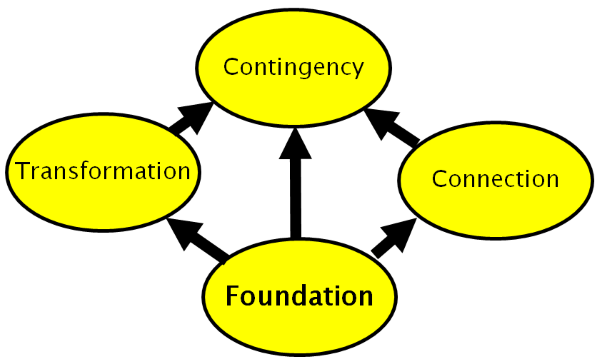What is the Knowledge Quartet?

The Knowledge Quartet (KQ) is a theoretical framework for the analysis and development of mathematics teaching. From the perspective of the KQ, the knowledge and beliefs evidenced in mathematics teaching can be seen in four dimensions (see image above), named foundation, transformation, connection and contingency. Read an introduction to the KQ here.
Foundation
Transformation
Connection
Contingency
Foundation
This category consists of knowledge, beliefs and understanding acquired in the academy, in preparation (intentionally or otherwise) for their role in the classroom. Such knowledge and beliefs inform pedagogical choices and strategies in a fundamental way. The key components of this theoretical background are: knowledge and understanding of mathematics per se and knowledge of significanttracts of the literature and thinking which has resulted from systematic enquiry into the teaching and learning of mathematics. The beliefs component relates to convictions held, and values espoused, by prospective teachers. Such beliefs typically concern different philosophical positions regarding the nature of mathematical knowledge, the purposes of mathematics education, and the conditions under which pupils will best learn mathematics. read scenarios
Transformation
This category concerns knowledge-in-action as demonstrated both in planning to teach and in the act of teaching itself. At the heart of this category, is Shulman’s observation that the knowledge base for teaching is distinguished by “ … the capacity of a teacher to transform the content knowledge he or she possesses into forms that are pedagogically powerful” (1987, p. 15). As Shulman indicates, the presentation of ideas to learners entails their re-presentation (our hyphen) in the form of analogies, illustrations, examples, explanations and demonstrations (Shulman, 1986, p. 9). This second category picks out behaviour that is directed towards a pupil (or a group of pupils) which follows from deliberation and judgement. Of particular importance is the trainees’ choice and use of examples presented to pupils to assist their concept formation, language acquisition and to demonstrate procedures. read scenarios
Connection
This category binds together certain choices and decisions that are made for the more or less discrete parts of mathematical content. It concerns the coherence of the planning or teaching displayed across an episode, lesson or series of lessons. Our conception of coherence includes the sequencing of topics of instruction within and between lessons, including the ordering of tasks and exercises which reflect deliberations and choices entailing both knowledge of structural connections within mathematics and an awareness of the relative cognitive demands of different topics and task contingency. read scenarios
Contingency
This category concerns classroom events that are almost impossible to plan for. In commonplace language, it is the ability to ‘think on one’s feet’. In particular, the readiness to respond to children’s ideas and a consequent preparedness, when appropriate, to deviate from an agenda set out when the lesson was prepared. A constructivist view of learning provides a valuable perspective on children’s contributions within lessons. To put aside such indications, or simply to ignore them or dismiss them as ‘wrong’, can be construed as a lack of interest in what it is that that child (and possibly others) have come to know as a consequence, in part, of the teacher’s teaching. However, Brown and Wragg (1993) observe that “our capacity to listen diminishes with anxiety” (p. 20). Uncertainty about the sufficiency of one’s subject matter knowledge may well induce such anxiety, although this is just one of many possible causes. read scenarios
What is the purpose of this website?
The purpose of this website is to support researchers wishing to use the Knowledge Quartet for the analysis of mathematics classroom-related data.
It provides comprehensive coverage to "grounded exemplars" of the 21 contributory codes from primary and secondary classrooms.
Understanding and Using the Knowledge Quartet
In recent years we have been:
- using the KQ as a tool to support focused reflection on the application of teacher knowledge of mathematics subject-matter and didactics in mathematics teaching (Corcoran 2007, Kleve 2009, Rowland & Turner, 2009, Turner, 2009).
- working with early-career teachers, pre-service teachers and their school-based mentors, and with university-based mathematics teacher educators, in applying the KQ to the development of mathematics teaching.
These participants often conceptualise one or more of the dimensions of the KQ in ways that differ from the understandings shared within the research team which conducted the classroom-based research leading to its development and conceptualisation.
“Essentially, the Knowledge Quartet provides a repertoire of ideal types that provide a heuristic to guide attention to, and analysis of, mathematical knowledge-in-use within teaching. However, whereas the basic codes of the taxonomy are clearly grounded in prototypical teaching actions, their grouping to form a more discursive set of superordinate categories – Foundation, Transformation, Connection and Contingency – appears to risk introducing too great an interpretative flexibility unless these categories remain firmly anchored in grounded exemplars of the subordinate codes.”
Ken Ruthven
Conceptualising mathematical knowledge in teaching. In T. Rowland and K. Ruthven (Eds). Mathematical Knowledge in Teaching. New York: Springer.
